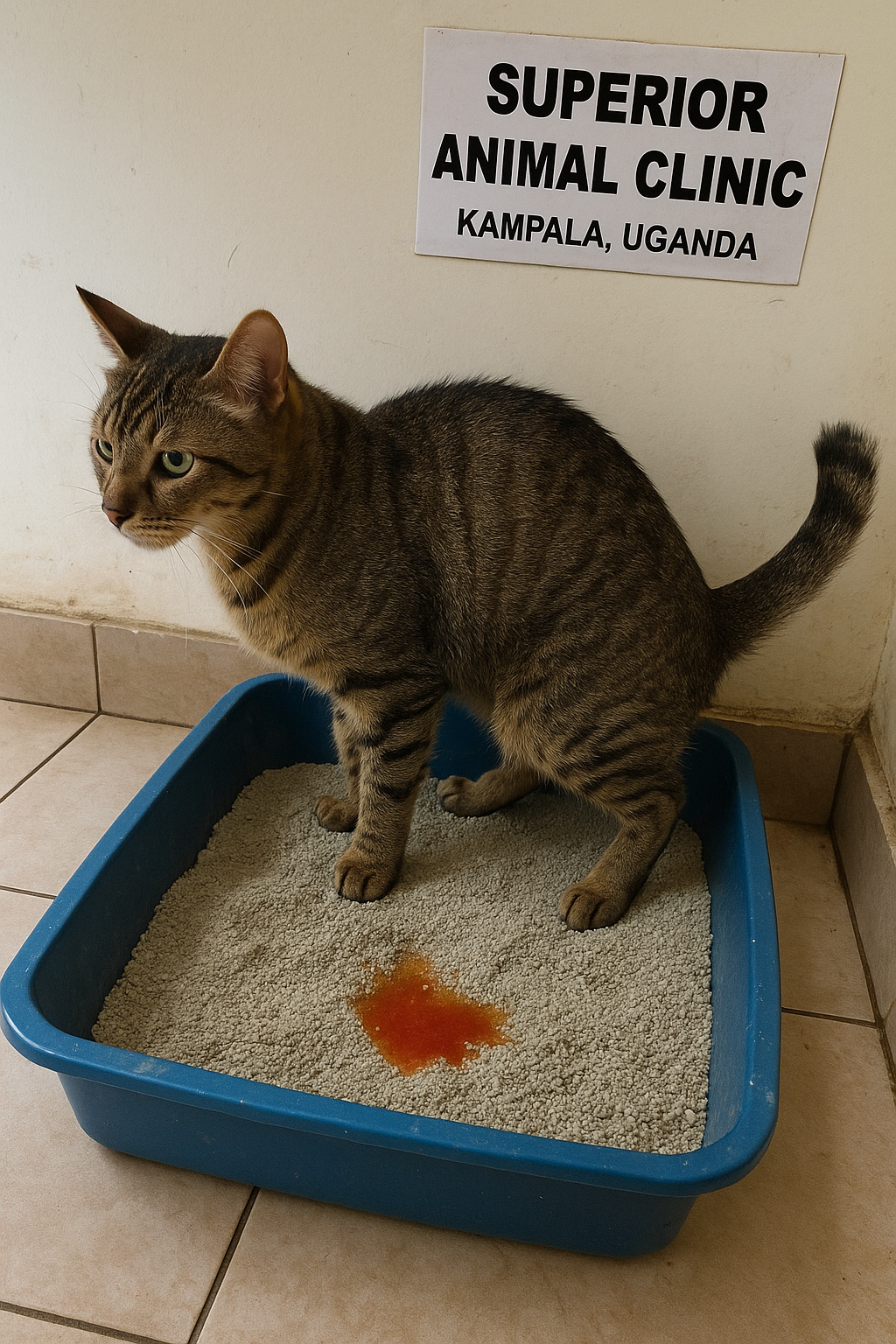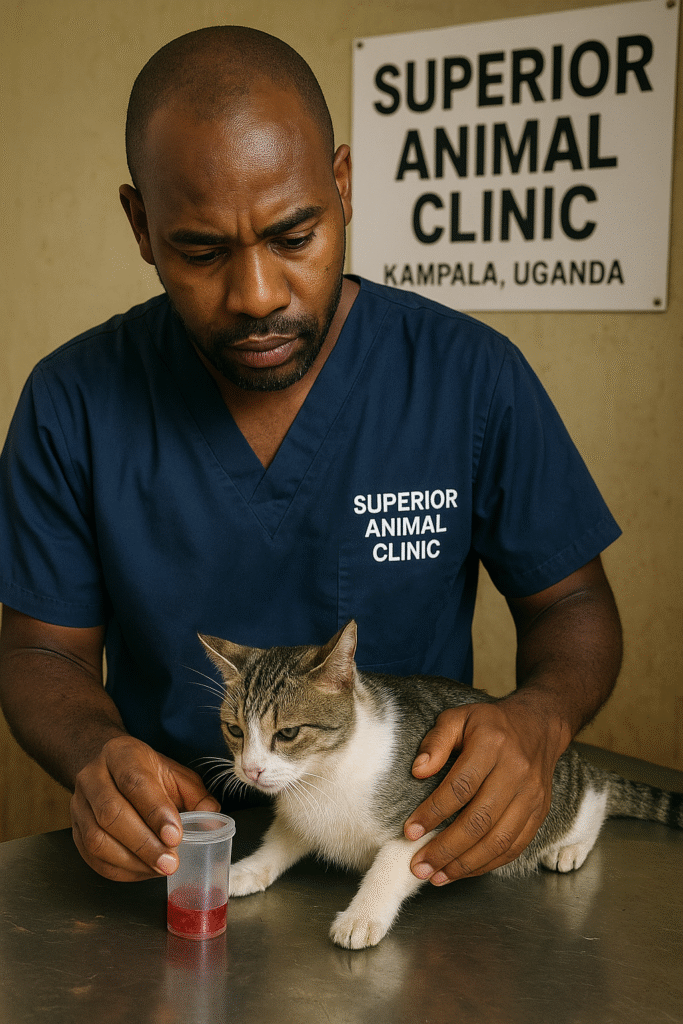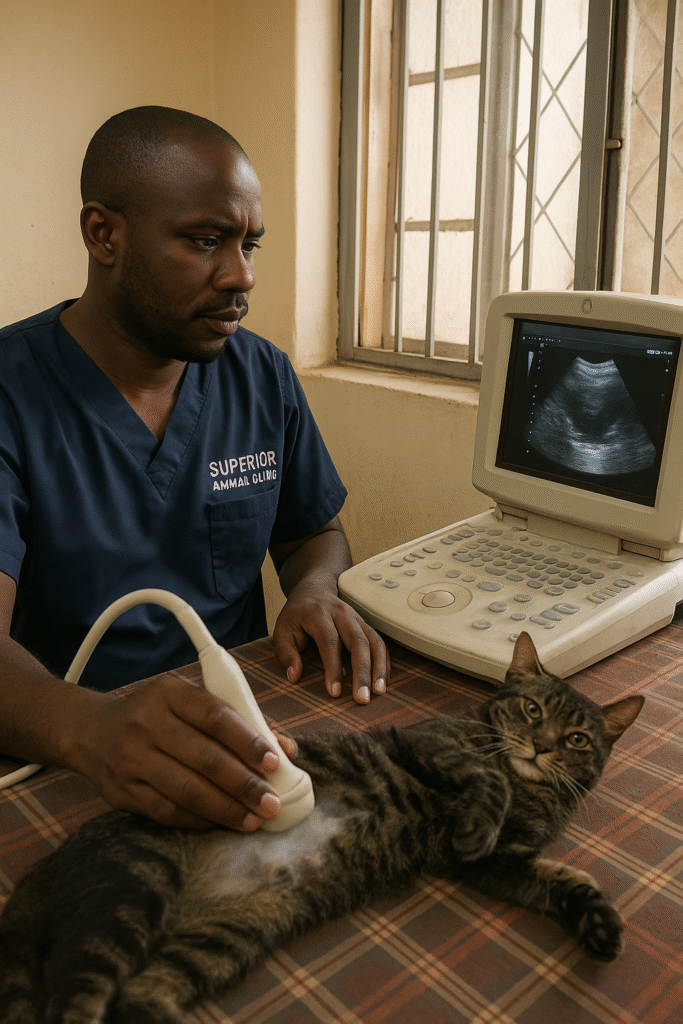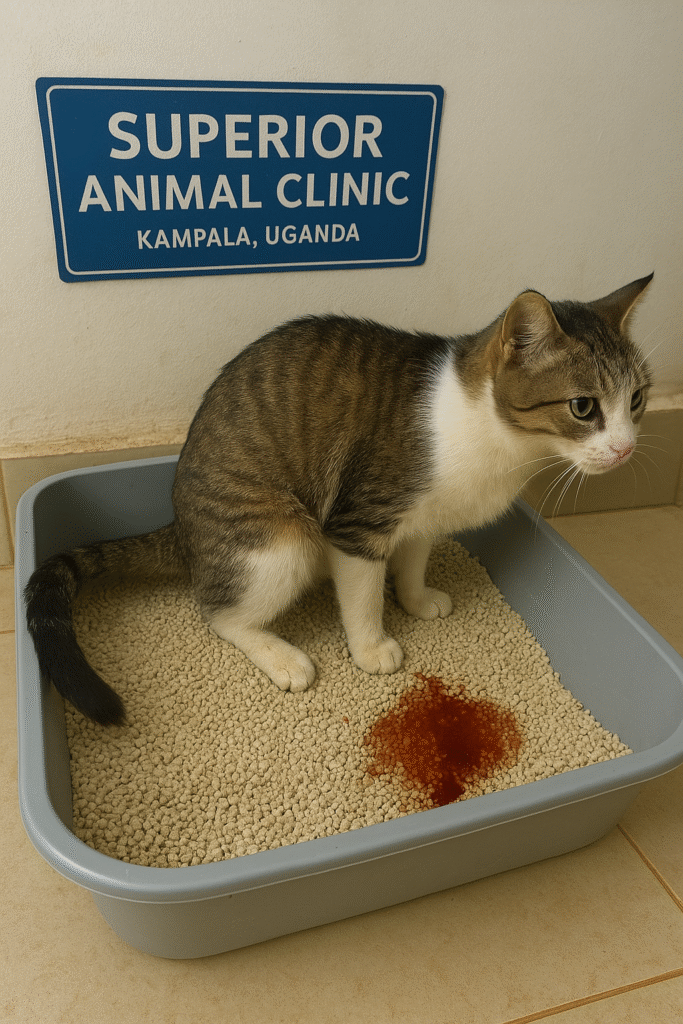
Finding blood in your cat’s urine can be alarming. Many cat owners in Kampala search online for answers using terms like “cat peeing blood Kampala,” “bloody urine in cats Uganda,” “best cat doctor near me,” “vet for cat urinary infection Kampala,” or “where to treat my cat with bloody urine in Makindye, Muyenga, or Ntinda.” If you’re reading this, you’re not alone—bloody urine (hematuria) in cats is a common problem, but it’s treatable with the right veterinary care.
At Superior Animal Clinic, located in Makindye along Salaama Road, we have successfully treated hundreds of cats with bloody urine from different parts of Kampala including Ntinda, Old Kampala, Kasubi, Nsambya, Katwe, Zana, Nakasero, Mityana, Buziga, Munyonyo, Nakawa, Rubaga, Muyenga, Naguru, Bugolobi, Kabowa, Kabojja, Lugogo, Lubowa, Seguku, Ndejje, Kololo, Mutundwe, Bukoto, Bulindo, and Kulambiro.
We are committed to making sure your cat gets the best diagnosis, treatment, and care for urinary problems.
What Does Bloody Urine in Cats Mean?
Bloody urine in cats (hematuria) is usually a sign of an underlying health problem. It could be something simple like stress or more serious conditions like urinary tract infections (UTIs), bladder stones, or even cancer. Cats often hide their pain, so noticing blood in the litter box or when your cat urinates is a clear red flag that you should visit a veterinarian immediately.
Common Causes of Bloody Urine in Cats in Uganda
Many cat owners in Kampala—from Makindye, Ntinda, Muyenga, Bugolobi, Munyonyo, Kololo, Ndejje, Zana, Kasubi, Old Kampala, and beyond—often ask us: “Why is my cat peeing blood?” The truth is, bloody urine (hematuria) is not a disease by itself but a warning sign of an underlying health problem. At Superior Animal Clinic, we see this condition frequently, and here are the most common causes every cat owner in Uganda should know about:
1. Feline Lower Urinary Tract Disease (FLUTD)
This is one of the leading causes of bloody urine in cats around Kampala. Stress, poor diet, and dehydration can irritate your cat’s bladder, leading to inflammation and blood in the urine. Indoor cats in areas like Ntinda, Muyenga, and Bugolobi are especially prone due to stress and limited exercise.
👉 Tip for cat owners: Reducing stress at home and providing plenty of water helps lower the risk.
2. Urinary Tract Infections (UTIs)
Just like humans, cats can get UTIs. This is more common in older cats or those with weak immunity. We frequently treat such cases at our clinic for cat owners coming from Makindye, Nsambya, Zana, and Kasubi. UTIs cause pain, frequent urination, and visible blood in the litter box.
👉 If your cat is straining in the litter box, bring them to us quickly before the infection spreads to the kidneys.
3. Bladder Stones (Urolithiasis)
Mineral deposits can form inside the bladder, scratching its lining and causing bleeding. This is a serious condition that can lead to complete blockage, especially in male cats. We often detect bladder stones in cats brought to us from Munyonyo, Lubowa, Seguku, and Kololo.
👉 Blocked cats need emergency care. Do not try home remedies—rush to Superior Animal Clinic immediately.
4. Kidney Disease
Chronic kidney disease is becoming more common in older cats in Uganda. Besides bloody urine, it may cause weight loss, vomiting, and excessive thirst. Cats from Mutundwe, Bukoto, and Kulambiro are often brought to our clinic with such symptoms.
👉 Early detection through blood and urine tests at our clinic can save your cat’s life.
5. Trauma or Injury
Outdoor cats in areas like Kasubi, Old Kampala, and Katwe sometimes come to us with bloody urine caused by accidents, fights, or falls. Any injury to the urinary tract can cause internal bleeding that shows up in the urine.
👉 Always check your outdoor cats for signs of pain or blood after fights or road accidents.
6. Tumors or Cancer
Although rare, tumors in the bladder or urinary tract can cause bloody urine. We mostly see this in older cats brought to us from Muyenga, Ntinda, and Nakasero.
👉 Regular vet checkups help detect such issues early.
7. Parasites and Other Infections
In certain parts of Uganda, urinary parasites can also irritate the bladder and cause blood in urine. While less common, it’s still a possible cause for cats in Mityana, Rubaga, and rural areas around Kampala.
8. Stress and Anxiety
Stress is a major trigger for urinary problems in cats. Loud environments, moving homes, new pets, or even changes in feeding schedules can stress cats in urban areas like Ntinda, Nakasero, and Old Kampala. Stress can lead to cystitis (bladder inflammation), which often results in blood in the urine.
👉 Tip for cat owners: Create a calm home environment and provide hiding spaces for your cat.
9. Dehydration
Cats in hot areas of Kampala such as Makindye, Munyonyo, and Buziga often don’t drink enough water. Dehydration makes urine too concentrated, which irritates the bladder and encourages crystal formation, leading to bloody urine.
👉 Encourage your cat to drink by offering clean water bowls and wet food.
10. Poor Diet and Dry Food Dependence
Many cats in Kampala are fed mostly dry kibble. Without enough water, dry food increases the risk of urinary crystals, stones, and bloody urine. At our clinic, we often see this problem in cats from Muyenga, Bugolobi, Lugogo, and Bukoto, where commercial dry foods are more common.
👉 Switching to a balanced diet with wet food helps protect your cat’s urinary health.
11. Poisoning or Toxins
Some cats accidentally ingest household poisons, spoiled food, or harmful plants. In areas like Katwe, Kasubi, and Ndejje, outdoor cats sometimes lick or eat toxic substances, damaging their urinary tract and kidneys, resulting in bloody urine.
👉 If you suspect poisoning, seek urgent veterinary help at Superior Animal Clinic.
12. Blood Clotting Disorders
Certain illnesses or inherited conditions can affect how a cat’s blood clots. This can cause bleeding in different organs, including the bladder. We occasionally diagnose this in cats from Kololo, Naguru, and Nakasero, where imported breeds are more common.
👉 Routine blood tests can help catch these rare but serious conditions early.
13. Diabetes in Cats
Diabetes, which we see in overweight cats in Lubowa, Seguku, and Makindye, weakens the immune system, making cats more prone to urinary infections that cause blood in urine.
👉 If your cat drinks a lot of water and still loses weight, have them tested for diabetes at our clinic.
14. High Blood Pressure (Hypertension)
Older cats, especially in Ntinda, Muyenga, and Bugolobi, may develop hypertension. High blood pressure can damage the delicate vessels in the urinary system, leading to bleeding.
👉 Regular blood pressure checks for senior cats are important to prevent complications.
15. Congenital (Birth) Defects
Some kittens are born with urinary tract malformations. We occasionally see such cases in younger cats from Mityana, Mutundwe, and Kasubi. These structural issues make them more likely to develop infections and bloody urine.
✅ At Superior Animal Clinic Makindye, we carefully diagnose each case to determine the exact cause of bloody urine in cats. Whether you’re in Ntinda, Muyenga, Bugolobi, Munyonyo, Kololo, or anywhere else in Kampala, our team provides the right treatment and long-term prevention advice for your cat.

Which Cats Are More Prone to Bloody Urine?
- Male cats – especially neutered males, because of narrower urethras.
- Indoor cats – with little activity or stress-related behaviors.
- Overweight cats – obesity increases the risk of urinary issues.
- Older cats – more likely to develop UTIs or kidney disease.
- Cats on dry food only diets – less water intake means more concentrated urine, leading to urinary crystals and stones.
Symptoms Cat Owners in Kampala Should Look Out For
- Straining to urinate
- Peeing outside the litter box
- Small drops of urine with blood
- Frequent attempts to urinate with little output
- Crying or meowing when using the litter box
- Licking the genital area excessively
If you notice these, don’t wait—bring your cat to Superior Animal Clinic for immediate care.
Treatment of Bloody Urine in Cats in Uganda
When cat owners in Kampala, Ntinda, Makindye, Muyenga, Bugolobi, Munyonyo, Lubowa, Nakasero, Old Kampala, and surrounding areas notice their cat urinating blood, the first question is always: “How is bloody urine treated in cats in Uganda?” At Superior Animal Clinic, we provide step-by-step, evidence-based treatment to make sure your cat gets better fast.
Step 1: Diagnosis First
Treatment depends on the exact cause. That’s why we start with:
- Urine analysis (to check for crystals, infection, blood cells)
- Blood tests (to check kidney function and overall health)
- Ultrasound or X-rays (to detect bladder stones, tumors, or blockages)
👉 Without a proper diagnosis, treatment may not work or the problem may come back.
Step 2: Medical Treatment Options at Superior Animal Clinic
Depending on the diagnosis, here are the treatments we use:
- Antibiotics – for urinary tract infections (UTIs)
- Common choices: Amoxicillin-Clavulanic Acid (Clavamox), Enrofloxacin (Baytril), Doxycycline
- These fight bacterial infections causing bloody urine.
- Common choices: Amoxicillin-Clavulanic Acid (Clavamox), Enrofloxacin (Baytril), Doxycycline
- Pain Relief & Anti-Inflammatory Drugs – to make your cat comfortable
- Meloxicam (Metacam) or Buprenorphine are commonly used.
- Meloxicam (Metacam) or Buprenorphine are commonly used.
- Urinary Catheterization – in blocked male cats
- A catheter is inserted to remove urine and flush out crystals or clots. This is life-saving.
- A catheter is inserted to remove urine and flush out crystals or clots. This is life-saving.
- IV Fluids (Drip)
- Helps flush the urinary system, rehydrate your cat, and support kidney function.
- Helps flush the urinary system, rehydrate your cat, and support kidney function.
- Special Prescription Diets – to prevent recurrence
- Royal Canin Urinary SO, Hill’s Prescription Diet c/d Multicare, Purina UR Urinary Diet
- These dissolve crystals and prevent bladder stone formation.
- Royal Canin Urinary SO, Hill’s Prescription Diet c/d Multicare, Purina UR Urinary Diet
- Surgery (Cystotomy or PU Surgery) – in severe cases
- If bladder stones are too large to dissolve, we surgically remove them.
- In recurrent blockages, perineal urethrostomy (PU surgery) is performed to create a wider urinary passage in male cats.
- If bladder stones are too large to dissolve, we surgically remove them.
Step 3: Supportive & Home Care Advice
At Superior Animal Clinic, we also guide you on:
- Switching from dry food to wet food to increase water intake.
- Adding water fountains so your cat drinks more.
- Stress management tips (playtime, reducing loud noises, separate litter boxes in multi-cat homes).
- Follow-up visits to ensure your cat is healing properly.
👉 Remember: Bloody urine in cats is always a sign of a serious problem. Home remedies may help with hydration, but they cannot cure infections, stones, or blockages. If you notice blood in your cat’s urine, visit Superior Animal Clinic in Makindye, along Salaama Road, Kampala, for immediate treatment.

🥩 Best Foods for Cats with Bloody Urine in Uganda
When your cat is diagnosed with bloody urine (hematuria), diet plays a big role in recovery and prevention. Many cat owners in Kampala, from Makindye to Ntinda, Muyenga, Lubowa, Bugolobi, and Munyonyo, ask us: “What is the best food for cats with urinary problems in Uganda?”
At Superior Animal Clinic, we recommend foods that keep your cat’s urine dilute, reduce crystals, and support bladder health. Here are the best options available on the Ugandan market:
1. Royal Canin Urinary SO
- Widely available in Kampala pet shops and vet clinics.
- Specially designed for cats with urinary tract issues.
- Helps dissolve urinary crystals and prevents recurrence.
- Comes in both wet and dry formulas (wet is better for hydration).
👉 Available at vet clinics in Makindye, Ntinda, Muyenga, and Lugogo pet stores.
2. Hill’s Prescription Diet c/d Multicare Urinary Care
- A trusted choice recommended by vets worldwide.
- Balances minerals like magnesium, calcium, and phosphorus to reduce stone formation.
- Comes in chicken-flavored dry food and wet food pouches/cans.
- Can be found in select vet clinics and large supermarkets in Nakasero, Kololo, and Lubowa.
3. Purina Pro Plan Veterinary Diets UR Urinary
- Helps manage urinary pH levels and reduce recurrence of urinary tract infections.
- Available in dry kibble and canned food.
- Often stocked by vet clinics in Bugolobi, Ntinda, and Rubaga.
4. Wet Cat Foods (Commercial Cans & Pouches)
Even if you can’t access prescription diets, switching to wet food increases hydration and reduces urinary problems. Brands often found in Kampala supermarkets and pet shops include:
- Whiskas Pouches & Cans
- Felix Cat Food
- Friskies Wet Food
- Sheba Pouches
👉 These are common in Nakawa, Katwe, Kasubi, and Old Kampala supermarkets.
5. Homemade Supportive Foods
If commercial diets are not accessible, you can support your cat with:
- Boiled chicken or fish (no salt, no spices)
- Broth (chicken/fish) added to dry kibble for extra hydration
- Rice with minced meat as a temporary gentle diet
⚠️ Note: Home diets are only supportive, not a replacement for prescription urinary diets.
💡 Tips for Cat Owners in Kampala
- Always choose wet food over dry kibble when possible.
- If feeding dry food, add water or broth to make it moist.
- Ensure your cat always has fresh, clean drinking water.
- Avoid feeding raw fish, bones, or salty foods—they worsen urinary issues.
✅ At Superior Animal Clinic in Makindye, Kampala, we help cat owners select the most suitable diet for cats experiencing bloody urine. We focus on high-quality options available locally in Uganda, and we can also source international brands that aren’t readily stocked. we provide expert guidance to find the best cat food in nearby pet stores and veterinary clinics.”
Home Remedies for Bloody Urine in Cats – Do They Work?
Some cat owners in Kampala try home remedies like:
- Giving more water
- Adding wet food
- Using cranberry supplements
👉 While these may offer temporary relief, they are NOT a replacement for veterinary treatment. A cat with bloody urine needs urgent professional care.
What Happens if You Don’t Treat Bloody Urine in Cats?
- Severe pain and suffering
- Complete urinary blockage (a life-threatening emergency, especially in male cats)
- Permanent kidney damage
- Death in untreated cases
How to Prevent Bloody Urine in Cats in Kampala
- Always provide clean drinking water
- Feed a balanced diet (preferably wet food or urinary diets)
- Keep your cat at a healthy weight
- Reduce stress with toys, play, and a calm environment
- Regular vet checkups at Superior Animal Clinic

Areas in Kampala Where Bloody Urine in Cats is Common
We often receive cases from:
- Urban areas like Makindye, Ntinda, Muyenga, Naguru, Bugolobi, Kololo – indoor cats, often stressed or on dry diets.
- Suburban areas like Kasubi, Ndejje, Mutundwe, Lubowa, Seguku, Zana – outdoor cats exposed to injuries, infections, and trauma.
- Coastal/near-water areas like Munyonyo, Buziga – higher cases of parasite-related urinary issues.
FAQs About Bloody Urine in Cats in Uganda
Q1: My cat is peeing blood but still eating—should I worry?
Yes. Bloody urine is never normal. Eating doesn’t mean your cat is fine. Visit us immediately.
Q2: Can I treat my cat’s bloody urine at home in Kampala?
No. You can support hydration and diet changes, but only a vet can properly treat it.
Q3: How much does it cost to treat a cat with bloody urine in Kampala?
Costs vary depending on the cause. At Superior Animal Clinic, we offer affordable and effective treatment options. Ranging from UGX 50,000 to 135,000
Q4: Is bloody urine in cats contagious to humans or other pets?
No, but underlying infections or parasites need prompt treatment to protect your cat’s health.
Q5: Where is the best veterinary clinic for bloody urine in cats in Kampala?
Superior Animal Clinic, Makindye along Salaama Road – trusted by cat owners across Kampala and nearby areas.
Why Choose Superior Animal Clinic for Bloody Urine Treatment in Cats?
- Experienced veterinarians in diagnosing and treating urinary problems
- Modern diagnostic tools (ultrasound, X-ray, lab tests)
- Affordable treatment plans tailored to cat owners in Uganda
- Conveniently located in Makindye, Kampala, serving all surrounding areas
- Compassionate care that prioritizes your cat’s comfort and health
👉 If your cat is showing signs of bloody urine in Kampala, don’t wait. Call or visit Superior Animal Clinic today. We proudly serve cat owners in Ntinda, Old Kampala, Kasubi, Nsambya, Katwe, Zana, Nakasero, Mityana, Makindye, Buziga, Munyonyo, Nakawa, Rubaga, Muyenga, Naguru, Bugolobi, Kabowa, Kabojja, Lugogo, Lubowa, Seguku, Ndejje, Kololo, Mutundwe, Bukoto, Bulindo, and Kulambiro.
Your cat deserves the best care—and we’re here to provide it.

WinPH777LoginPhilippines is perfect for local players! Easy deposit options and a wide range of games. Try your luck kabayan! winph777loginphilippines